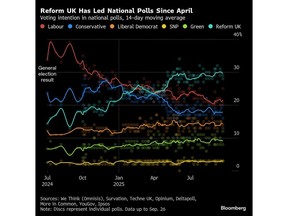
Article content
(Bloomberg) — Rachel Reeves’ attempt to blame Brexit for the UK’s flagging economy risks playing down the broader causes of the country’s malaise, senior economists said.
THIS CONTENT IS RESERVED FOR SUBSCRIBERS ONLY
Subscribe now to read the latest news in your city and across Canada.
- Exclusive articles from Barbara Shecter, Joe O'Connor, Gabriel Friedman, and others.
- Daily content from Financial Times, the world's leading global business publication.
- Unlimited online access to read articles from Financial Post, National Post and 15 news sites across Canada with one account.
- National Post ePaper, an electronic replica of the print edition to view on any device, share and comment on.
- Daily puzzles, including the New York Times Crossword.
SUBSCRIBE TO UNLOCK MORE ARTICLES
Subscribe now to read the latest news in your city and across Canada.
- Exclusive articles from Barbara Shecter, Joe O'Connor, Gabriel Friedman and others.
- Daily content from Financial Times, the world's leading global business publication.
- Unlimited online access to read articles from Financial Post, National Post and 15 news sites across Canada with one account.
- National Post ePaper, an electronic replica of the print edition to view on any device, share and comment on.
- Daily puzzles, including the New York Times Crossword.
REGISTER / SIGN IN TO UNLOCK MORE ARTICLES
Create an account or sign in to continue with your reading experience.
- Access articles from across Canada with one account.
- Share your thoughts and join the conversation in the comments.
- Enjoy additional articles per month.
- Get email updates from your favourite authors.
THIS ARTICLE IS FREE TO READ REGISTER TO UNLOCK.
Create an account or sign in to continue with your reading experience.
- Access articles from across Canada with one account
- Share your thoughts and join the conversation in the comments
- Enjoy additional articles per month
- Get email updates from your favourite authors
Sign In or Create an Account
or
Article content
The Chancellor of the Exchequer is planning to pin an expected downgrade in growth expectations by the Office for Budget Responsibility on the 2016 decision to leave the European Union and the years of austerity that preceded it. The gamble is that Brexit is an explanation voters will be likely to understand as the budget watchdog punches a multibillion pound hole in Reeves’ spending plans and forces her to raise taxes again.
Article content
Article content
Article content
The strategy represents a shift for Prime Minister Keir Starmer, a remainer who has avoided talking about Brexit while courting leave-supporting voters who grew disillusioned with the Conservatives. It’s an approach that’s grown more attractive to the governing Labour Party as a key architect of the campaign to leave the EU, Nigel Farage, and his populist Reform UK emerge its chief rival.
Article content
By signing up you consent to receive the above newsletter from Postmedia Network Inc.
Article content
The budget due Nov. 26 is a moment of peril for Reeves, who vowed she wouldn’t have to come back for more after raising taxes in last year’s budget. The OBR’s expected growth cut — along with policy U-turns and the rising cost of borrowing — have left her needing as much as £35 billion ($47 billion) to close a new fiscal hole.
Article content
But economists said the chancellor’s efforts to blame Brexit are misleading because much of the slump in output per worker, which drives growth and living standards, happened before the referendum and was mirrored across the EU. The turning point was not 2010, but the 2008 global financial crisis, or even earlier, when Labour was last in power.
Article content
“We can say for certain it isn’t just Brexit,” Jonathan Portes, professor of economics at King’s College London, said. “The productivity slump has clearly not just been in the UK. Europe has been better, but not much.”
Article content
Article content
Reeves’ argument draws on analysis that shows UK productivity has undershot pre-2008 trends by about 25%. But Hetal Mehta, head of economic research at St James’ Place, said the UK’s productivity problems “pre-date the Brexit referendum.”
Article content
Office for National Statistics estimates published in October 2016 suggest the productivity shortfall was already 18% in 2015, the year before the Brexit vote.
Article content
Panmure Liberum Chief Economist Simon French, meanwhile, posted on X that while “Brexit had a role by making the UK less competitive,” it is just one factor in the downgrade along with government policies on energy, housing, pensions and post-2008 financial services regulation.
Article content
Reeves tested her argument in a Bloomberg TV interview last week, saying that the OBR used “past productivity performance to forecast the future and it is true that under the previous government over the last 14 years, both growth and productivity were underwhelming.”
Article content
In a statement to the International Monetary Fund in Washington on Friday, Reeves said separately: “The UK’s productivity challenge has been compounded by the way in which the UK left the European Union.” She repeated the claim at an investment summit on Tuesday.

.jpg) 10 hours ago
3
10 hours ago
3
 English (US)
English (US)